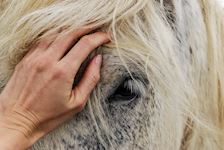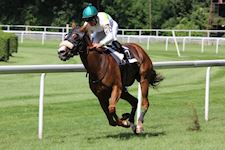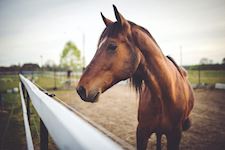Horse Breeding - Endorsed Certificate Course (TQUK - Training Qualifications UK)
Distance learning based course with study materials, tutor support and final exam included
Academy For Distance Learning
Summary
- Exam(s) / assessment(s) is included in price
- Tutor is available to students
Add to basket or enquire
Overview
Horse Breeding Online Course.100 Hours Endorsed Certificate Course (TQUK - Training Qualifications UK).
Breeding is undertaken to improve the quality of animals as well as to increase the number of animals.
By selecting (hence controlling) the mother and father of a new foal, a horse breeder can exercise a degree of control over the characteristics of a new animal. Over time, breeding has allowed us to produce animals more suited to specific tasks:
• breeds with greater endurance so they can be ridden for longer distances
• breeds that run faster, for racing
• breeds with greater strength to be used for heavier work
Benefits of an ADL Endorsed Course?
Endorsed courses are skills based. They have been evaluated and approved by an independent awarding body such as Training Qualifications UK (TQUK).
What makes ADL’s Endorsed courses different?
- Flexible Self-Paced Learning– adjust your learning around your home and work commitments
- Start and Finish at any time
- Courses globally and industry relevant
- Practical Component at the end of most lessons.
Allocated your own tutor relevant to your subject. You can have as little or as much contact as you like with your tutor. They are there to support you all the way through.
This course is endorsed by TQUK -Training Qualifications UK, an OFQUAL awarding body.
Achievement
Course media
Description
Lesson Structure: Horse Breeding BAG307
- Lesson 1
- Why breed horses?
- An understanding of heritability is fundamental
- Meiosis
- The Work of Gregor Mendel
- Chromsomes and Genetics in Breeding
- Selecting the mare and the stallion
- Quantitative and Qualitative Inheritance
- Inbreeding and Linebreeding
- The Genetic Effect of Inbreeding
- Line Breeding
- Advantages of Inbreeding
- Stallion and Mare Complementation
- The Industry
- Lesson 2
- Mare Anatomy
- The Reproductive Cycle of the Mare
- Hormonal Control
- Abnormal Oestrus
- Breeding Fitness
- General Broodmare Care
- Nutrition and Feeding
- Rations
- Carbohydrates
- Fat
- Protein
- Vitamins
- Roughage
- Hay
- Pre-Season Care
- Lesson 3
- Stallion Anatomy
- Sperm Production
- Semen Release
- Reproductive Cycle of the Stallion
- Breeding Fitness
- General Stallion Care
- Handling
- Pre-Season Care
- Stallion Management for Reproduction
- Training the young stallion
- Steps in training a novice stallion onto the phantom
- Common clinical problems with stallions
- Castration (Gelding)
- Lesson 4
- Managing the Arrival and Departure of the horse at the stud
- Semen from the stallion
- Collection and Processing
- Evaluating the Quality of Sperm
- Breeding methods
- Natural Breeding
- Live cover – In-hand or Pasture
- Artificial insemination
- Handling Frozen Semen
- Embryo transfer
- When to breed
- Detection of Oestrus
- Teasers
- Visual Signs
- A plan for when things go wrong
- Sexually Transmitted Infections
- Lesson 5
- Pre-natal growth
- Conception of twins
- Gestation and Methods and Detecting Pregnancy
- Methods of Diagnosis
- Palpation
- Pregnancy Tests
- Ultrasound
- Post-Natal Growth
- Lesson 6
- Care of the Pregnant Mare
- Nutritional Requirements
- Caslicked Mares
- Preparation for foaling
- Exercise Needs
- Worming
- A deworming program for mares
- Preparation of the foaling environment
- Preparation for if things go wrong
- The Physical Environment - Bedding
- Common Bedding in the Foaling Environment
- Straw
- Wood Shavings
- Wood Pellets
- Rubber Matting
- The Parturition Process
- Stages of Labour
- Common Foaling Problems
- Dystokia
- Abnormal Presentations
- Health Problems of the post-partum mare
- Retained placenta
- Haemorrhage
- Post-Partum Metritis
- Rejection of the Foal
- Prolapsed Uterus
- Lactation (Udder edema)
- Lactation (reduced milk supply)
- Foal and foaling reports
- Example Foaling Record
- Example Foal Report
- Lesson 7
- General newborn care
- Stabling and safe environment for newborn foals
- Lactation and suckling
- Premature Foals
- Orphan foals
- Common health problems in newborn foals
- Infections, Constipation and Diarrhoea
- Septicaemia
- Meconium Impaction
- Diarrhoea
- Congenital disorders
- Neonatal Isoerythrolysis (NI)
- Angular Limb Deformities
- Flexor and Extensor Tendon Abnormalities
- Delayed Ossification of the Cuboidal Bones
- Heart Murmurs
- Congenital Papilloma (Warts)
- Entropion
- Neurological disorders
- Neonatal Maladjustment Syndrome (NMS)
- Head Tilt
- Structural abnormalities
- Uroperitoneum
- Umbilical Hernias
- Training a foal in the earliest stages
- Lesson 8
- Introduction to Fertility
- Understanding Fertility in Mares
- Understanding Fertility in Stallions
- Handling and Management in Stallions
- Age
- Overuse
- Nutrition
- Illness and Injury
- Other Abnormalities
- Semen problems
- Haemospermia
- Urospermia
- Oligospermia
- Structural disorders of the reproductive tract (mares)
- Pneumovagina
- 'Maiden Cervix' or Cervical Incompetence
- Vesicovaginal Reflux or Urine Pooling
- Structural disroders of the reproductive tract (stallions)
- Cryptorchidism
- Testicle Conformation
- Testicular Torsion
- Testicular Tumours
- Scrotal Hernia
- Venereal diseases (mares)
- Endometritis
- Bacterial Endometritis
- Fungal Endometritis
- Mating Induced Endometritis
- Contagious Equine Metritis (CEM)
- Equine Viral Arteritis (EVA)
- Pyometra
- Abnormal Oestrus Cycles
- Silent Heat and Post-Partum Anoestrus
- Persistant Oestrus
- Vernal Transition
- Ovarian Tumours
- Persistant Corpus Luteum
- Haemorrhagic Follicles
- Abortion
- Venereal diseases (stallions)
- Bacterial Infections
- Equine Viral Arteritis (EVA)
- Equine Coital Exanthema
- Dourine
- Contagious Equine Metritis (CEM)
- Infectious causes of abortion (mares)
- Viral Abortion
- Bacterial Abortion
- Leptospirosis
- Non-infectious causes of abortion (mares)
- Congenital Defects
- Twinning
- Umbilical Cord Torsion
- Progesterone Deficiency
Each lesson culminates in an assignment which is submitted to the academy, marked by the academy's tutors and returned to you with feedback, any relevant suggestions, comments, and if necessary, extra reading.
Who is this course for?
Horse Breeders, Stable Hands, Grooms, Farriers, Horse Trainers
Requirements
A pc or laptop with internet connection.
Career path
There are many yards in the UK that breed, produce and train their own livestock. They are prevalent in the racing industry with many studs in the UK and internationally. Careers in breeding or stud work can range from the practical, hands on work such as stud groom or stallion handler to the more office based roles such as stud manager, marketer or secretary.
Questions and answers
Currently there are no Q&As for this course. Be the first to ask a question.
Reviews
Currently there are no reviews for this course. Be the first to leave a review.
Legal information
This course is advertised on reed.co.uk by the Course Provider, whose terms and conditions apply. Purchases are made directly from the Course Provider, and as such, content and materials are supplied by the Course Provider directly. Reed is acting as agent and not reseller in relation to this course. Reed's only responsibility is to facilitate your payment for the course. It is your responsibility to review and agree to the Course Provider's terms and conditions and satisfy yourself as to the suitability of the course you intend to purchase. Reed will not have any responsibility for the content of the course and/or associated materials.





